New Discoveries in Beethoven?
Posted by: mikeeschman on 01 August 2009
Anyone found a new performer of Beethoven that really knocks you out?
I am primarily interested in the piano sonatas and the symphonies.
For the piano sonatas I have Pollini, Barenboim, Glenn Gould, Arrau and Rudolph Serkin.
For the symphonies I have Gardiner, Jochum, Reiner, Szell and Stokowski.
Thanks in advance for any recommendations.
I am primarily interested in the piano sonatas and the symphonies.
For the piano sonatas I have Pollini, Barenboim, Glenn Gould, Arrau and Rudolph Serkin.
For the symphonies I have Gardiner, Jochum, Reiner, Szell and Stokowski.
Thanks in advance for any recommendations.
Posted on: 01 August 2009 by Lontano
Very highly regarded recent recordings. Vol 4 won Gramophone Recording of the Year
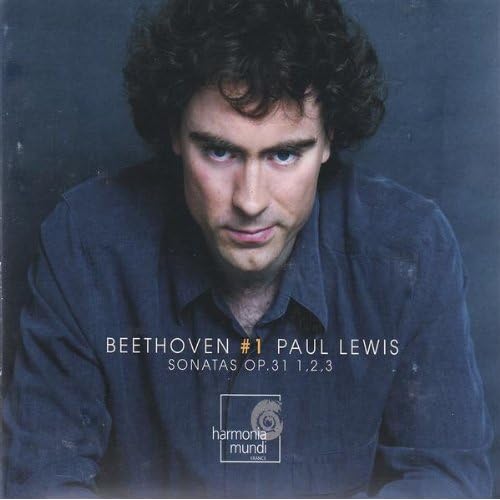

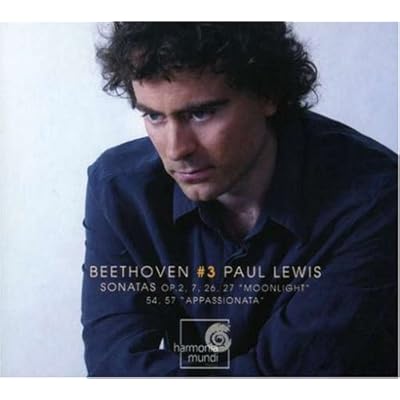
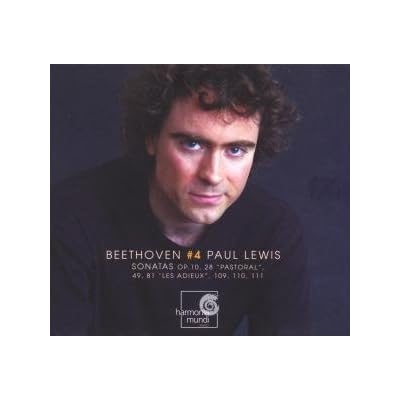




Posted on: 01 August 2009 by beebie
I was quite impressed by this disc by an artist I'd not heard of before - Jonathan Gilad in sonatas 5, 17 & 23 - incl a very good Apassionata
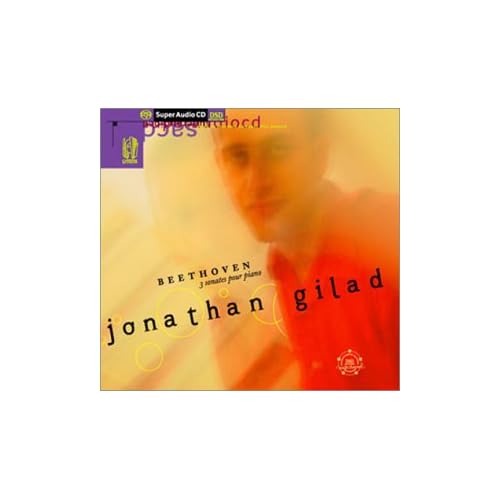
Not exactly a new performer but a rare recording from live by a great master - Carlos Kleiber in the 7th with the Bavarian State Orchestra

It knocks spots off his DG 7th with the Vienna Phil.

Not exactly a new performer but a rare recording from live by a great master - Carlos Kleiber in the 7th with the Bavarian State Orchestra

It knocks spots off his DG 7th with the Vienna Phil.
Posted on: 01 August 2009 by beebie
Francois-Frederic Guy, another young Frenchman - this is a superb Hammerklavier:
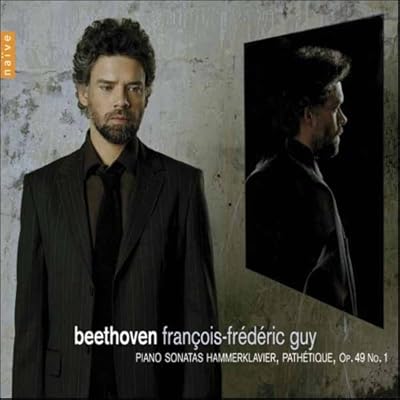

Posted on: 01 August 2009 by Earwicker
quote:Originally posted by beebie:
Not exactly a new performer but a rare recording from live by a great master - Carlos Kleiber in the 7th with the Bavarian State Orchestra
It knocks spots off his DG 7th with the Vienna Phil.
OOooo, that's just gone on my shopping list!!
Yep, the Guy recording is excellent. I like Paul Lewis, but he does sound a shade anonymous compared with the best. Still, much to enjoy!
Posted on: 01 August 2009 by Earwicker
Sorry, you were after recommendations -
Angela Hewitt and Daniel Müller-Schott are superb in their first installment of the cello sonatas - from what I've heard this is going to be the new benchmark following a succession of recent excellent versions of these works. Also, I must just give a quick recommendation for this:
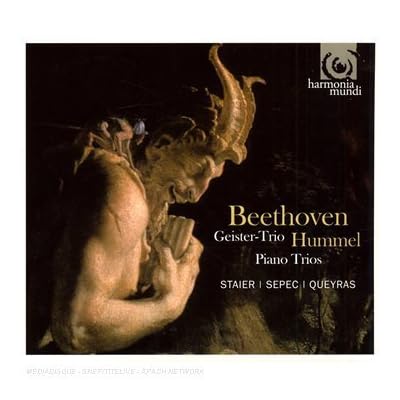
An absolute scorcher on period instruments, I loved every microsecond of it!!
Angela Hewitt and Daniel Müller-Schott are superb in their first installment of the cello sonatas - from what I've heard this is going to be the new benchmark following a succession of recent excellent versions of these works. Also, I must just give a quick recommendation for this:

An absolute scorcher on period instruments, I loved every microsecond of it!!
Posted on: 01 August 2009 by Florestan
First off - Earwicker - YES, I couldn't agree more ! I love those two discs.
As for the question of Beethoven piano sonatas and symphonies - which ones are the knockouts? Well, I am probably the wrong guy to place an opinion here about this. Last count I had between 25 -30 complete sets of piano sonatas. Almost as many Piano Concertos. Symphonies maybe half this amount. I believe their is something valuable in each one of these recordings. I'll offer just a couple of more (unusual) recommendations.
I'm not so sure how many non-pianists might view this but from my view listening to the symphonies transcribed for piano by Franz Liszt is one of the most exhilarating listening experiences I could recommend. It is out of this world. Mike, your better half is a pianist. Please, try this one as an alternate when you want to give Jochum, von Karajan, Abbado, Harnoncourt, Rattle, Bohm or Klemperer etc. the night off. For example, when you hear the Allegretto from the 7th symphony in A+ I wonder if you wouldn't agree too that this comes across really well on the piano. If you are very familiar with the symphonies you will hear all the context, ideas and story lines you are familiar with but delivered amazingly by only 10 fingers through a piano. I happen to love the sound of a nice piano.

When I start to learn a Piano Sonata I usually do some serious listening and comparing between the various sets. Like I said earlier I simply have a hard time declaring any one of them outright winners because they are all good in their own way. Because we're all individuals it's easy to understand that most recordings deliver a style relevant to the performers character. After a while you begin to understand the different stylistic differences or philosophies of each. For instance, Backhaus might have a fantastic rhythm, Kempff a wonderful lyricism, Brendel has an intellectual approach etc.
At the moment I'd like to recommend three choices that might not be on the usual "power lists." (tomorrow it would different again)...
Andras Schiff is a very intelligent player and I have come to like this set. (I recently learnt Op. 10, No. 2 with this recording as my main teacher)
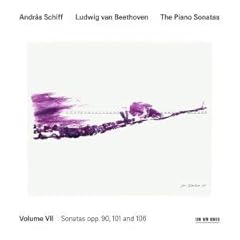
Anton Kuerti is another one who takes a scholarly approach. For learning the sonatas this is a very good set to have. The digital remaster of this set does have some problems with it (sound is important to me) but otherwise no other issues (other than it could come in a better box). Anton Kuerti wrote the booklet notes and if, for no other reason, you want to learn something about these sonatas and the sonata form itself you owe it to your self to get this set for that alone. Probably the best notes out of all my sets.

Stephen Kovacevich is slightly more aggressive than the previous two mentioned. If you like exciting and a definite difference between your pianos and fortes I guess this would be a good choice.
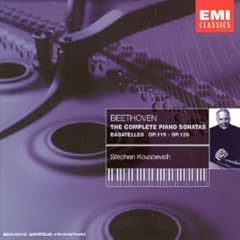
So Mike, if you only want a few killer sets for yourself I don't envy you. It is hard to choose and know what you will connect with in the long run. If you can collect and aim for a larger library then you have it made because their is lots of great choice out their.
You cannot go wrong with any of the usual big names: Backhaus, Kempff (2 sets), Arrau, Brendel (3 sets), Barenboim (3 sets), Ashkenazy, Goode, Pollini.
Regards,
Doug
As for the question of Beethoven piano sonatas and symphonies - which ones are the knockouts? Well, I am probably the wrong guy to place an opinion here about this. Last count I had between 25 -30 complete sets of piano sonatas. Almost as many Piano Concertos. Symphonies maybe half this amount. I believe their is something valuable in each one of these recordings. I'll offer just a couple of more (unusual) recommendations.
I'm not so sure how many non-pianists might view this but from my view listening to the symphonies transcribed for piano by Franz Liszt is one of the most exhilarating listening experiences I could recommend. It is out of this world. Mike, your better half is a pianist. Please, try this one as an alternate when you want to give Jochum, von Karajan, Abbado, Harnoncourt, Rattle, Bohm or Klemperer etc. the night off. For example, when you hear the Allegretto from the 7th symphony in A+ I wonder if you wouldn't agree too that this comes across really well on the piano. If you are very familiar with the symphonies you will hear all the context, ideas and story lines you are familiar with but delivered amazingly by only 10 fingers through a piano. I happen to love the sound of a nice piano.

When I start to learn a Piano Sonata I usually do some serious listening and comparing between the various sets. Like I said earlier I simply have a hard time declaring any one of them outright winners because they are all good in their own way. Because we're all individuals it's easy to understand that most recordings deliver a style relevant to the performers character. After a while you begin to understand the different stylistic differences or philosophies of each. For instance, Backhaus might have a fantastic rhythm, Kempff a wonderful lyricism, Brendel has an intellectual approach etc.
At the moment I'd like to recommend three choices that might not be on the usual "power lists." (tomorrow it would different again)...
Andras Schiff is a very intelligent player and I have come to like this set. (I recently learnt Op. 10, No. 2 with this recording as my main teacher)

Anton Kuerti is another one who takes a scholarly approach. For learning the sonatas this is a very good set to have. The digital remaster of this set does have some problems with it (sound is important to me) but otherwise no other issues (other than it could come in a better box). Anton Kuerti wrote the booklet notes and if, for no other reason, you want to learn something about these sonatas and the sonata form itself you owe it to your self to get this set for that alone. Probably the best notes out of all my sets.

Stephen Kovacevich is slightly more aggressive than the previous two mentioned. If you like exciting and a definite difference between your pianos and fortes I guess this would be a good choice.

So Mike, if you only want a few killer sets for yourself I don't envy you. It is hard to choose and know what you will connect with in the long run. If you can collect and aim for a larger library then you have it made because their is lots of great choice out their.
You cannot go wrong with any of the usual big names: Backhaus, Kempff (2 sets), Arrau, Brendel (3 sets), Barenboim (3 sets), Ashkenazy, Goode, Pollini.
Regards,
Doug
Posted on: 01 August 2009 by mikeeschman
I am going to buy every single recommended recording on this thread over the next two or three months, but I had to order the Beethoven Liszt Symphonies on piano right now. The idea of it is extremely appealing.
I had it shipped FedEx, so I expect it in my hands by Wednesday.
Happy to be excited again, waiting for new music to appear on my doorstep :-)
I had it shipped FedEx, so I expect it in my hands by Wednesday.
Happy to be excited again, waiting for new music to appear on my doorstep :-)
Posted on: 01 August 2009 by mikeeschman
Poked around Sheet Music Plus and found Dover Editions of the Liszt Beethoven Symphonies Piano Transcriptions. Should arrive by the weekend.
Hot diggity dog :-)
Hot diggity dog :-)
Posted on: 01 August 2009 by yeti42
Radu Lupu was stunning when I saw him last year even though he was so ill he had to abandon the concert at the interval.
Posted on: 02 August 2009 by Starre
I can recommend the Stephen Kovacevich complete beethoven recordings which Florestan said above.
I am a pianist so I think I can be qualified to say so .
.
I am a pianist so I think I can be qualified to say so
Posted on: 02 August 2009 by Whizzkid
Mike,
This is the final part in the only set of sonatas that I have. I really like them and they are played on a period Fortepiano. They are Sacds and a little pricey but worth it in my mind. Now looking for a good set of modern piano sonatas though to compare.
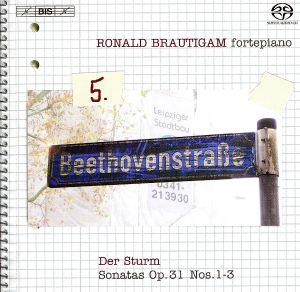
Though isn't ToddA the MAN when it comes to the history of recorded sonatas?
Dean...
This is the final part in the only set of sonatas that I have. I really like them and they are played on a period Fortepiano. They are Sacds and a little pricey but worth it in my mind. Now looking for a good set of modern piano sonatas though to compare.

Though isn't ToddA the MAN when it comes to the history of recorded sonatas?
Dean...
Posted on: 02 August 2009 by Oldnslow
Volume 6 of Brautigam's Beethoven sonatas on fortepiano, including the Waldstein and Appassionata, is now available, and it is superb. If you are interested in a good set on a modern piano, in superb sound, I recommend David Allen Wehr's set (4 volumes of double CDs) on Connossieur Society--available directly through the label a very good price.
Posted on: 02 August 2009 by Todd A
quote:Originally posted by Florestan:
Probably the best notes out of all my sets.
Really? I find them pretentious and in some parts just plain silly - like his rationale for including the Op 49 sonatas. The notes aren't quite as bad as Russell Sherman's, but that's not saying much.
I saw Paul Lewis' recordings mentioned previously. It's a great set for those who like their Beethoven dull. The praise heaped upon Lewis by Gramophone is one of the worst cases of British magazines over-praising British artists I've yet seen. He's a mediocrity that will fade into oblivion before his career is over.
--
Posted on: 02 August 2009 by Todd A
[This quick summary of the various piano sonata cycles I've heard was originally for another forum.]
Intense, strong: Annie Fischer
Fast, lean, intense: Friedrich Gulda (Amadeo), Stephen Kovacevich, Seymour Lipkin
Fast, lean, lithe: Michael Levinas, Yukio Yokoyama, Kun Woo Paik (okay, not as lean as the others)
Slower, lean, not quite as lithe: Aldo Ciccolini, Paul Badura-Skoda (Gramola)
“Intellectual,” meticulous: Alfred Brendel (all three, with the analog Philips cycle the best), Friedrich Gulda (Decca – harder to describe), Craig Sheppard, Andras Schiff
Old-style cavalier pianism (though not in the 19th Century fashion): Yves Nat (for a Gallic flavor), Wilhelm Backhaus (for a Germanic one; mono cycle is better), Dino Ciani (though his is newer style)
“Romantic,” but also meticulous: Daniel Barenboim (all three, his most recent DVD cycle being his best)
Swift(ish), warm, poetic: Andrea Lucchesini
Poetic, measured: Wilhelm Kempff (mono cycle is better), John O’Conor
Large-scaled, broad: Emil Gilels, Claudio Arrau, Ikuyo Nakamichi, Paul Lewis
Individual, idiosyncratic, even eccentric: Eric Heidsieck, Russell Sherman, Anton Kuerti, Georges Pludermacher
(Mostly) straight-forward, no-nonsense playing: Claude Frank, Alfredo Perl, David Allen Wehr, Robert Silverman, Gerard Willems, Akiyoshi Sako, Takahiro Sonoda, Andre De Groote
Boring and/or bland: Richard Goode, Abdel Rahman El Bacha, Jean Bernard Pommier, John Lill, Ian Hobson
Superbly played but still boring: Vladimir Ashkenazy
Terrible: Anne Øland
As to buying: If sound quality is critical, then Ikuyo Nakamichi (pretty good) or Paul Lewis (boring) are the way to go. If it’s price, then Friedrich Gulda (Amadeo), Andrea Lucchesini, or Claude Frank make sense.
My own top ten is roughly along these lines:
Annie Fischer
Friedrich Gulda (Amadeo)
Wilhelm Backhaus (mono)
Wilhelm Kempff (mono)
Robert Silverman
Eric Heidsieck
Emil Gilels
Artur Schnabel
Russell Sherman
Claude Frank
--
Intense, strong: Annie Fischer
Fast, lean, intense: Friedrich Gulda (Amadeo), Stephen Kovacevich, Seymour Lipkin
Fast, lean, lithe: Michael Levinas, Yukio Yokoyama, Kun Woo Paik (okay, not as lean as the others)
Slower, lean, not quite as lithe: Aldo Ciccolini, Paul Badura-Skoda (Gramola)
“Intellectual,” meticulous: Alfred Brendel (all three, with the analog Philips cycle the best), Friedrich Gulda (Decca – harder to describe), Craig Sheppard, Andras Schiff
Old-style cavalier pianism (though not in the 19th Century fashion): Yves Nat (for a Gallic flavor), Wilhelm Backhaus (for a Germanic one; mono cycle is better), Dino Ciani (though his is newer style)
“Romantic,” but also meticulous: Daniel Barenboim (all three, his most recent DVD cycle being his best)
Swift(ish), warm, poetic: Andrea Lucchesini
Poetic, measured: Wilhelm Kempff (mono cycle is better), John O’Conor
Large-scaled, broad: Emil Gilels, Claudio Arrau, Ikuyo Nakamichi, Paul Lewis
Individual, idiosyncratic, even eccentric: Eric Heidsieck, Russell Sherman, Anton Kuerti, Georges Pludermacher
(Mostly) straight-forward, no-nonsense playing: Claude Frank, Alfredo Perl, David Allen Wehr, Robert Silverman, Gerard Willems, Akiyoshi Sako, Takahiro Sonoda, Andre De Groote
Boring and/or bland: Richard Goode, Abdel Rahman El Bacha, Jean Bernard Pommier, John Lill, Ian Hobson
Superbly played but still boring: Vladimir Ashkenazy
Terrible: Anne Øland
As to buying: If sound quality is critical, then Ikuyo Nakamichi (pretty good) or Paul Lewis (boring) are the way to go. If it’s price, then Friedrich Gulda (Amadeo), Andrea Lucchesini, or Claude Frank make sense.
My own top ten is roughly along these lines:
Annie Fischer
Friedrich Gulda (Amadeo)
Wilhelm Backhaus (mono)
Wilhelm Kempff (mono)
Robert Silverman
Eric Heidsieck
Emil Gilels
Artur Schnabel
Russell Sherman
Claude Frank
--
Posted on: 02 August 2009 by mikeeschman
quote:Originally posted by Todd A:
[This quick summary of the various piano sonata cycles I've heard was originally for another forum.]
Intense, strong: Annie Fischer
Fast, lean, intense: Friedrich Gulda (Amadeo), Stephen Kovacevich, Seymour Lipkin
Fast, lean, lithe: Michael Levinas, Yukio Yokoyama, Kun Woo Paik (okay, not as lean as the others)
Slower, lean, not quite as lithe: Aldo Ciccolini, Paul Badura-Skoda (Gramola)
“Intellectual,” meticulous: Alfred Brendel (all three, with the analog Philips cycle the best), Friedrich Gulda (Decca – harder to describe), Craig Sheppard
Old-style cavalier pianism (though not in the 19th Century fashion): Yves Nat (for a Gallic flavor), Wilhelm Backhaus (for a Germanic one; mono cycle is better), Dino Ciani (though his is newer style)
“Romantic,” but also meticulous: Daniel Barenboim (all three, his most recent DVD cycle being his best)
Swift(ish), warm, poetic: Andrea Lucchesini
Poetic, measured: Wilhelm Kempff (mono cycle is better), John O’Conor
Large-scaled, broad: Emil Gilels, Claudio Arrau, Ikuyo Nakamichi, Paul Lewis
Individual, idiosyncratic, even eccentric: Eric Heidsieck, Russell Sherman, Anton Kuerti, Georges Pludermacher
(Mostly) straight-forward, no-nonsense playing: Claude Frank, Alfredo Perl, David Allen Wehr, Robert Silverman, Gerard Willems, Akiyoshi Sako, Takahiro Sonoda, Andre De Groote
Boring and/or bland: Richard Goode, Abdel Rahman El Bacha, Jean Bernard Pommier, John Lill, Ian Hobson
Superbly played but still boring: Vladimir Ashkenazy
Terrible: Anne Øland
As to buying: If sound quality is critical, then Ikuyo Nakamichi (pretty good) or Paul Lewis (boring) are the way to go. If it’s price, then Friedrich Gulda (Amadeo), Andrea Lucchesini, or Claude Frank make sense.
My own top ten is roughly along these lines:
Annie Fischer
Friedrich Gulda (Amadeo)
Wilhelm Backhaus (mono)
Wilhelm Kempff (mono)
Robert Silverman
Eric Heidsieck
Emil Gilels
Artur Schnabel
Russell Sherman
Claude Frank
--
I think this kind of listing is more appropriate to discussing ice cream or food processors for publication in Consumer Reports, than it is to discussing and evaluating the piano sonatas of Beethoven.
Paul Lewis is the next Beethoven I will acquire
once the Liszt Beethoven piano transcriptions are paid for.
Posted on: 02 August 2009 by Todd A
quote:Originally posted by mikeeschman:
I think this kind of listing is more appropriate to discussing ice cream or food processors for publication in Consumer Reports,
Whatever.
I've covered a number of the cycles in far more detail elsehwere, and as for "discussing" Beethoven's sonatas, please point out where that has really occured in this thread. Posting links to images of CD covers and a few blurbs don't really make for much of a "discussion."
--
Posted on: 02 August 2009 by mikeeschman
quote:Originally posted by Todd A:
as for "discussing" Beethoven's sonatas, please point out where that has really occured in this thread. Posting links to images of CD covers and a few blurbs don't really make for much of a "discussion."
--
Here's one from this thread :
"For example, when you hear the Allegretto from the 7th symphony in A+ I wonder if you wouldn't agree too that this comes across really well on the piano."
That's a specific invitation to listen and compare. And it will be followed up.
Unexplained references to the poetic, meticulous, individual, boring, bland or intellectual have no grounding in the music and are fundamentally unmusical. In other words, they have no specific musical meaning.
Better to pick a few (or a single) work and place your comments in a musical context focused on the playing, the music or both.
Fred Simon has done this for me on several occasions, sending me back to the recording, the score, or both. Those are happy occasions full of musical excitement.
Can't get enough of that kind of give and take.
I think it would be quite entertaining to start a thread on one movement from a recording and "drill down" until no one had anything left to say. Maybe one day that will happen.
Posted on: 02 August 2009 by Todd A
quote:Originally posted by mikeeschman:
"For example, when you hear the Allegretto from the 7th symphony in A+ I wonder if you wouldn't agree too that this comes across really well on the piano."
That's a specific invitation to listen and compare. And it will be followed up.
Unexplained references to the poetic, meticulous, individual, boring, bland or intellectual have no grounding in the music and are fundamentally unmusical. In other words, they have no specific musical meaning.
Better to pick a few (or a single) work and place your comments in a musical context focused on the playing, the music or both.
Well, then, you are either confused or extremely bad at communicating what you really want. Or both. Sayeth you: "Anyone found a new performer of Beethoven that really knocks you out?" Well, I did in my list with admittedly brief comments.
Then you say, no, I want something with "musical meaning" and offer the initial quote which is rather amorphous and simply talks about the Allegretto coming across well on piano. Not exactly a deep musical "discussion" there.
Also, at the beginning of your musical "discussion" you list the various artists without mentioning any musical attributes about the recordings you have. Curious.
--
Posted on: 02 August 2009 by mikeeschman
quote:Originally posted by Todd A:quote:Originally posted by mikeeschman:
"For example, when you hear the Allegretto from the 7th symphony in A+ I wonder if you wouldn't agree too that this comes across really well on the piano."
That's a specific invitation to listen and compare. And it will be followed up.
Unexplained references to the poetic, meticulous, individual, boring, bland or intellectual have no grounding in the music and are fundamentally unmusical. In other words, they have no specific musical meaning.
Better to pick a few (or a single) work and place your comments in a musical context focused on the playing, the music or both.
Well, then, you are either confused or extremely bad at communicating what you really want. Or both. Sayeth you: "Anyone found a new performer of Beethoven that really knocks you out?" Well, I did in my list with admittedly brief comments.
Then you say, no, I want something with "musical meaning" and offer the initial quote which is rather amorphous and simply talks about the Allegretto coming across well on piano. Not exactly a deep musical "discussion" there.
Also, at the beginning of your musical "discussion" you list the various artists without mentioning any musical attributes about the recordings you have. Curious.
--
I listed what I have so that the recommendations given would all be things I don't have. The listing of what I have has no other purpose.
I was simply irritated with your brutal dismissal of Paul Lewis. I consider that bad form. It requires some explanation, an unanticipated slap in the face.
I'm over it now. I think you know what I mean.
Posted on: 02 August 2009 by Todd A
quote:Originally posted by mikeeschman:
I think you know what I mean.
No, I have no idea what you mean, because I have to rely on what you write, not what you were thinking when your wrote it.
---
Posted on: 02 August 2009 by Earwicker
quote:Originally posted by Todd A:
I saw Paul Lewis' recordings mentioned previously. It's a great set for those who like their Beethoven dull. The praise heaped upon Lewis by Gramophone is one of the worst cases of British magazines over-praising British artists I've yet seen. He's a mediocrity that will fade into oblivion before his career is over.
Hmm, that's a bit harsh but I agree he's overrated. Musicianly if anonymous is how I'd describe his Beethoven. The last three come across reasonably well where his "do good by stealth" approach comes off better; he's got a nice sense of classical style in the earlier works, especially Op 10.
"The Best" in so far as there is such a thing in these great works is Brendel's digital set, although I hasten to add that I've never heard his early Vox recordings. The early seventies analogue recordings of the late sonatas for Philips are PAINFULLY dull and dynamically flat with muddy sound too, with the notable exception of 101; Brendel's digital set should be preferred in all cases, most particularly for the live "Hammerklavier", challenged in supremacy only by Gilels on DG, and his 109,110,111 disc is among the finest recordings you'll ever hear of anything. Having said that, I've grown too familiar with them and when I actually sit and listen to the sonatas these days it's usually Kempff's mono; all Kempff's 50s recordings are very dear to me just now, the late Brahms pieces in particular are balm to my tortured soul.
EW
Posted on: 02 August 2009 by mikeeschman
quote:Originally posted by Todd A:quote:Originally posted by mikeeschman:
I think you know what I mean.
No, I have no idea what you mean, because I have to rely on what you write, not what you were thinking when your wrote it.
---
OK.
Here's a question. What specifically makes a performance of the Opus 110 sonata lean? And what would be its opposite?
Posted on: 02 August 2009 by Todd A
quote:Originally posted by Earwicker:
"The Best" in so far as there is such a thing in these great works is Brendel's digital set....Brendel's digital set should be preferred in all cases, most particularly for the live "Hammerklavier", challenged in supremacy only by Gilels on DG, and his 109,110,111 disc is among the finest recordings you'll ever hear of anything.
Suffice it to say, I disagree pretty much completely. Of Brendel’s three sets, I find his analog Philips set the best, and find his 109 from that cycle to be superb. I find him very weak in Op 106, though, and while Gilels is much better, I can’t say he’s one of my favorites – he’s just way too slow.
quote:Originally posted by mikeeschman:
Here's a question. What specifically makes a performance of the Opus 110 sonata lean? And what would be its opposite?
For me lean means sparse pedaling and staccato playing as opposed to more generous pedaling and legato playing. My descriptions were general and not focused on one work.
--
Posted on: 02 August 2009 by mikeeschman
quote:Originally posted by Todd A:
For me lean means sparse pedaling and staccato playing as opposed to more generous pedaling and legato playing. My descriptions were general and not focused on one work.
--
Fair enough. That is much more illuminating than lean. Quite useful. I think I will go reread your listing with that in mind. How about lithe?
Posted on: 02 August 2009 by Todd A
Further comments on the 106 and circling back to Lewis at the same time: while I dislike Lewis' cycle as a whole, his Op 106 is arguably one of the highlights of his cycle, and is one of the best modern recordings (ie, last 20 years or so) of the work. If he could play everything at or near this level, then my opinion of him would change. But, on recorded evidence, he cannot or at least does not.
--
--
